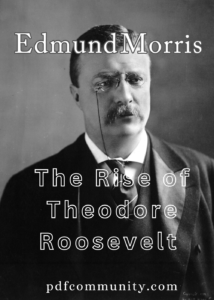Edmund Morris’s The Rise of Theodore Roosevelt is an insightful biography of one of America’s most dynamic presidents. Covering Roosevelt’s life up to his presidency, the book paints a vivid portrait of his character, energy, and ambition. Below is a detailed summary organized with suitable headings, followed by the main points.
Introduction: The Early Years
Theodore Roosevelt was born on October 27, 1858, in New York City. A frail and asthmatic child, young Roosevelt faced physical challenges that shaped his character. His wealthy family provided him with resources to pursue education and adventure. Despite his health issues, Roosevelt’s father inspired him to develop strength and courage.
From an early age, Roosevelt exhibited a love for nature and intellectual curiosity. He collected specimens and studied them meticulously, showing a budding interest in science and exploration. His privileged upbringing allowed him to travel extensively, which broadened his horizons and deepened his resolve to overcome personal weaknesses.
Education and Intellectual Growth
Roosevelt attended Harvard University, where he thrived academically and socially. He studied history, biology, and philosophy while remaining physically active. Harvard was a transformative experience, sharpening his intellect and teaching him leadership skills.
During his college years, tragedy struck when his father passed away. This loss deeply affected Roosevelt, but he channeled his grief into achieving his goals. After graduating, he briefly attended Columbia Law School, but his passion for politics and adventure soon drew him away.
Entering Politics: A Rising Star
Roosevelt’s political career began when he was elected to the New York State Assembly in 1881. As a young legislator, he earned a reputation for fighting corruption and advocating for reform. He faced resistance from political elites but stood firm in his convictions.
Roosevelt’s personal life was marked by both joy and tragedy during this time. He married Alice Hathaway Lee, but their happiness was short-lived. In 1884, Alice and his mother died on the same day. Devastated, Roosevelt retreated to the Badlands of Dakota Territory, where he sought solace in ranching and the wilderness.
The Cowboy Life: Building Resilience
In the Badlands, Roosevelt reinvented himself as a cowboy and rancher. This period of his life was crucial in building his resilience and self-reliance. He learned to manage cattle, survive harsh winters, and confront lawlessness.
Roosevelt’s time in the West also strengthened his connection to nature and conservation. He experienced firsthand the beauty and challenges of the American frontier, shaping his future policies as a conservationist.
Return to Politics: Reform and Leadership
Roosevelt returned to New York rejuvenated and determined to make a difference. He remarried, this time to Edith Carow, and began a family. Back in politics, he served in various roles, including New York City Police Commissioner and Assistant Secretary of the Navy.
As Police Commissioner, Roosevelt reformed the corrupt department and implemented policies to improve public safety. He was known for his hands-on approach, often walking the streets at night to ensure officers were performing their duties.
The Spanish-American War: Hero of San Juan Hill
Roosevelt’s military career began during the Spanish-American War in 1898. Resigning as Assistant Secretary of the Navy, he formed the Rough Riders, a volunteer cavalry unit. Roosevelt and his men became national heroes after their courageous charge up San Juan Hill in Cuba.
The war solidified Roosevelt’s image as a fearless leader and patriot. His popularity skyrocketed, paving the way for his political ascent.
Governor of New York and Vice Presidency
After the war, Roosevelt was elected Governor of New York. He continued his reform agenda, targeting corporate monopolies and political corruption. His progressive policies earned him both admirers and enemies within his party.
In 1900, Roosevelt was chosen as William McKinley’s running mate in the presidential election. Although the role of Vice President was largely ceremonial, Roosevelt’s charisma and energy helped secure the victory.
Becoming President: A Sudden Rise
In September 1901, President McKinley was assassinated, and Roosevelt became the youngest president in U.S. history at 42. His rise to power marked a significant turning point in American politics. Roosevelt brought vigor and progressive ideas to the presidency, signaling a new era of leadership.
Conclusion: Legacy of the Early Years
The Rise of Theodore Roosevelt ends with his ascension to the presidency, highlighting the qualities that defined his life—determination, intellect, and an unrelenting drive for reform. Morris captures the essence of Roosevelt as a man who lived with boundless energy and purpose, setting the stage for his transformative presidency.
Main Points of the Summary
- Early Life: Roosevelt overcame physical challenges through determination, inspired by his father.
- Education: At Harvard, he developed his intellect and leadership skills.
- Entry into Politics: He started his political career with a focus on fighting corruption.
- Personal Tragedies: The deaths of his wife and mother shaped his character profoundly.
- Life in the Badlands: Ranching in the West built his resilience and connection to nature.
- Return to Reform Politics: He re-entered public service with a focus on progressive reforms.
- Military Heroism: His leadership in the Spanish-American War cemented his national popularity.
- Governor and Vice President: Roosevelt’s progressive policies as Governor of New York showcased his leadership skills.
- Presidential Rise: McKinley’s assassination propelled Roosevelt into the presidency, beginning a new chapter in American politics.
- Legacy: Roosevelt’s early life and career laid the foundation for his transformative role as a leader.

